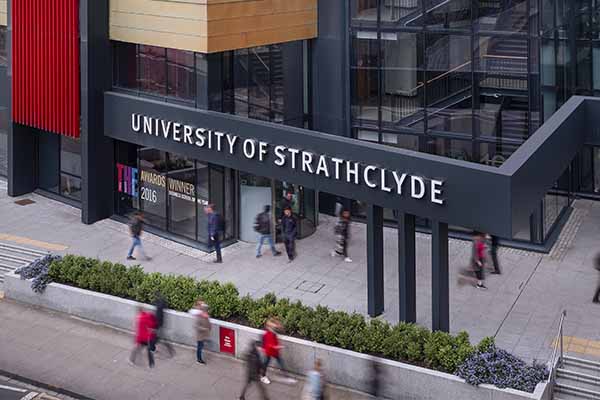Why Strathclyde?

The summer prior to starting my MSc in Data Analytics at the University of Strathclyde, I was still not entirely sure what the next step would be. I had recently graduated from the University of St Andrews with a BSc in Computer Science, and although applying for jobs as a software developer was what I always expected to do following my course, I became less confident in this choice as my final year unfolded.
With the Covid-19 pandemic hitting the whole country, jobs seemed much harder to come by, and I was worried about my own lack of work experience (apart from university projects) affecting my prospects even further. I had also discovered that the aspects of computer science that I enjoyed the most involved a strong focus on people and users, and data analysis. These factors led to delaying my job applications for a year, and instead looking for a Masters programme that could help me specialise in data-related knowledge and eventually lead to finding a job in a data field.
I eventually came across the course at Strathclyde, and I realised that it ticked all the boxes for me. I would be able to study at an institution with a very strong reputation within Scotland, I would learn the industry-relevant knowledge I would need, and it would even help address my lack of experience through the ‘Data Analytics in Practice’ module, which involved working in several projects with outside clients. This external work also extended to dissertation projects, where a large number of the projects you can choose from involve working directly with an external client. This can lead to valuable connections or job opportunities. The combination of technical knowledge and industry experience presented a rare opportunity that was hard to pass up.
The experience
The MSc course itself was just as I had hoped – it combined modules from three different departments (Management Science, Mathematics & Statistics, and Computer & Information Sciences) to cover a wide variety of technical aspects and knowledge within data analytics. There are many wide ranging elective modules to choose from: 'Financial Econometrics', 'Health Economics & Evaluation', ‘Machine Learning for Data Analytics’ or even ‘Bayesian Spatial Statistics’. This allows students to either cover weaknesses, consolidate strengths, or just try out something completely new that may be interesting to do. The course attracted a diverse group of students, coming from different disciplines and countries and at varying stages in their lives. The variety of classes on offer allows each student to challenge themselves in the best way to advance their own career. Some key aspects are compulsory, such as learning how to write code and create models in R and Python, but other technical aspects such as database design and business simulation methods are left for students to pick. The course ensures that the material is accessible and that everyone can learn these skills from scratch, even if they have never written code before.
The module that really brings everything else together is the previously mentioned ‘Data Analytics in Practice’. This module is excellent at giving students a taste of the type of issues faced in real settings, and is especially great if the goal is to prepare yourself for what will come in the future. As part of a group together with fellow students, you will need to work efficiently to solve problems that can vary from improving traffic control for Glasgow City Council to designing a price prediction model for the value of Bitcoin. These highly challenging tasks give you a chance to solidify the knowledge you’ve picked up from other modules. Presenting findings in front of those outside clients is also challenging, and it is invaluable experience for more client-facing roles like consulting. It also gives you plenty of chances to talk to people from your course, which is especially helpful at a time when social interaction was so limited.
Online teaching

Online learning was an added obstacle, but one that I feel the University dealt with very well overall. Lecturing was done well despite the lack of face-to-face presenting that many were used to, and online resources were always made available when needed. Although there were growing pains while both lecturers and students got used to this new format, the teaching was still done to a high standard and lecturers remained helpful and approachable when needed through tutorials and drop-in sessions. The staff and the University in general were great at trying to make me feel valued as a student, both during the course and after its completion through job opportunities, references and their friendliness. Some positive teaching methods such as recording lectures became more common as well, and with lecturers having more experience with what works and what doesn’t, expect the quality to improve even more in the future.
Final words
The MSc is a great opportunity to expand your knowledge within data analytics, as it offers plenty of different and varied challenges you can take on.
Things like teamwork and presenting were things I had limited experience of before this course, but I decided to come out of my comfort zone and challenge myself to improve in those areas, which I feel has helped me immensely. I recommend the course to anyone seeking to develop a combination of both technical and practical skills within data analytics, but I also recommend challenging yourself. Whether it is something you’ve never done before but are curious to try, something you know you really need to improve in, or a new aspect of something you thought you knew well, use this course as a learning opportunity and as a building block for your future success!
